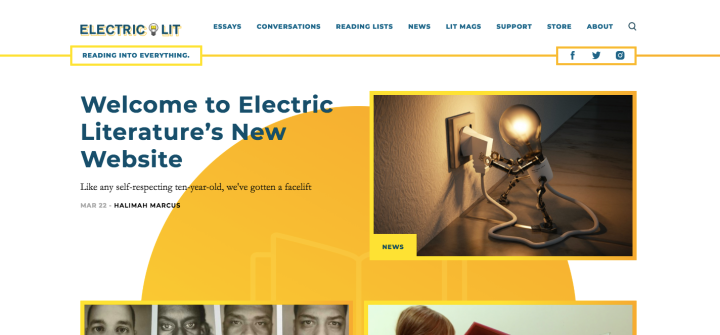Electric Literature launched 10 years ago in Brooklyn, New York, as a quarterly print journal with a mission to make literature more relevant, exciting, and inclusive. And today they’re celebrating the launch of a new website on WordPress, at electricliterature.com.
Surviving (and thriving) for ten years as an independent publisher is no small feat. Over the years the nonprofit organization has grown its online audience — with offerings like Recommended Reading and The Commuter — while expanding its membership of readers who help fund its work. The website is free to everyone and relies on the generosity of its community to donate to the site and support its mission.
How does an indie website make its business work in 2019? We talked with Electric Lit’s Executive Director Halimah Marcus about some of the lessons they’ve learned in the past 10 years.

Slow and Steady Growth Can Be a Very Good Thing
Sometimes raising a lot of money from investors means you’ll grow fast — but also burn out sooner. “Slow and steady growth has been important to our longevity thus far. Ten years for some companies isn’t that long, but ten years for an indie online magazine is quite long. We’ve seen many of our peers close during that time and also many publications that were much better funded and larger than us as well.”
Focus On Your Mission
Marcus and company made a deliberate decision early to become a nonprofit with a mission to support writers. “That was an interesting discussion. For the most part I think it was the right decision, although there are many different ways to look at this question. We were definitely a mission-driven organization. With Recommended Reading we partner with other magazines and indie presses and publications to promote their work and to give an online platform to many stories that have never been published online and never would be published online.
“It was our goal to build a literary ecosystem, to showcase how diverse it was and to give access to it. There was nothing about what we were doing that was about making money [laughs]. Becoming a nonprofit to be mission-driven, to be able to have access to grant opportunities, to be able to solicit donations and make those tax-deductible was going to be important for our financial model.” As a nonprofit, Electric Literature receives funding from foundations including the Amazon Literary Partnership, the New York State Council on the Arts, and the National Endowment for the Arts — an important source of funding for a publisher when revenue from online advertising can fluctuate dramatically from month to month.
Memberships (and Your Members) Matter
Direct funding from readers makes a big difference for the business. Electric Literature does not paywall its essays or fiction — the site is totally free and readers have an option to donate or subscribe with a recurring monthly payment.
Its membership program hit some bumps when it briefly moved it to Medium — the platform switched its membership model in 2018 and Electric Literature was one of several publishers who were left scrambling. Marcus’s advice? Think carefully about who you let between you and your readers — it’s very hard to regain subscribers after you’ve lost them.
Most important of all is making sure those who do donate to your publication feel special. “I think the lesson that I’m always learning and figuring out how to do better is to make those people who have shown you that they care about your publication and that they’re invested in it feel included and appreciated. Make sure they know who they can talk to if they have a question or if they just want to make a comment or they have a problem. That’s something that is so important.”
Make Your Home on the Web Your Own
“You’ll see that on the new website the look is very vibrant and positive and is pulled through every article and every space. Icons inspired by electrical symbols such as signals and inverters are a part of the design we were able to bring through. It’s important to be able to have control over what our product looks like. Our editorial vision is now able to extend to the way the work is presented and what it looks like.”
For more on Electric Lit’s new site, check out Marcus’s letter to readers.

